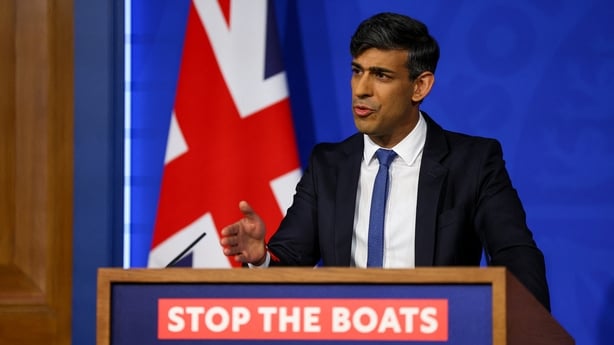Taoiseach Simon Harris has asked the Minister for Justice to bring emergency laws to cabinet to enable International Protection applicants to be sent back to the UK.
It comes after it emerged 80% of recent arrivals came here from the UK via the land border with Northern Ireland.
British Prime Minister Rishi Sunak has said this shows his government's so-called Rwanda policy is working as a deterrent.
In response to Mr Sunak’s comments, a spokesperson for the Taoiseach said Mr Harris "does not comment on the migration policies of any other country but he is very clear about the importance of protecting the integrity of the migration system in Ireland.
"Ireland has a rules-based system that must always be applied firmly and fairly," the spokesperson said.
"In that context, the Taoiseach has asked the Minister for Justice to bring proposals to Cabinet next week to amend existing law regarding the designation of safe 'third countries' and allowing the return of inadmissible International Protection applicants to the UK.
"This is one of a number of measures we are taking to strengthen our system and ensure that it is strong, effective and agile. Rules and the integrity of our migration system will be to the fore of our actions."
Minister for Justice Helen McEntee is expected to discuss a new returns policy with the British government when she visits London on Monday.
Speaking on RTÉ's Six One News, Ms McEntee said: "There are many reasons why we have seen an increase in migration toward Ireland.
"What's clear in the decision that the UK have taken in choosing Brexit they have actually seen an increase in people seeking asylum in their country. The way that they deal with that, it's their policy.
"My focus as Minister for Justice is making sure that we have an effective immigration structure and system.
"That's why I'm introducing fast processing, that's why I'll have emergency legislation at Cabinet this week to make sure that we can effectively return people to the UK and that's why I'll be meeting with the Home Secretary to raise these issues on Monday."
The deterrent is working
In an interview to be broadcast on the Sunday Morning with Trevor Phillips programme on Sky News tomorrow, British Prime Minister Rishi Sunak said this shows the deterrent of his government's Rwanda policy is working.
The Rwanda policy will see asylum seekers coming to the UK being placed on a one-way flight to the east African nation, with the aim of deterring others from crossing the English Channel on small boats.
The legislation ensuring the plan is legally sound, the Safety of Rwanda (Asylum and Immigration) Act, cleared its passage through the UK Parliament this week and was signed into law on Thursday.

During the interview, Mr Sunak was challenged over whether the UK is simply exporting the problem.
"My focus is on the United Kingdom and securing our borders," Mr Sunak said.
"But what that comment illustrates is a couple of things.
"One, that illegal migration is a global challenge, which is why you’re seeing multiple countries talk about doing third-country partnerships, looking at novel ways to solve this problem, and I believe will follow where the UK has led.
"But what it also shows, I think, is that the deterrent is, according to your comment, already having an impact because people are worried about coming here and that demonstrates exactly what I’m saying.
"If people come to our country illegally, but know that they won’t be able to stay, they’re much less likely to come, and that’s why the Rwanda scheme is so important."
Downing Street rebuffed claims yesterday that the Rwanda plan was already influencing movements into Ireland, saying it was too early to jump to conclusions on its impact.
Speaking in Dublin on Friday, Tánaiste Micheál Martin said: "Clearly, we’ve had an increase in the numbers coming into Northern Ireland into the Republic.
"And it’s fairly obvious that a Rwanda policy, if you’re a person in a given situation in the UK and well, then you don’t want to go to Rwanda - not that anybody has gone yet, I hasten to add.
"So I think it’s a fair comment of mine. There are many other issues - it’s not in any way trying to blame anything or anything like that."
But a No 10 spokeswoman told journalists in Westminster: "It is too early to jump to specific conclusions about the impact of the act and treaty in terms of migrant behaviour.
"Of course, we will monitor this very closely and we already work very closely as you would expect with the Irish Government, including on matters relating to asylum.
"But of course, the intention behind the Act is to have it serve as a deterrent and that is why we are working to get flights off the ground as swiftly as possible."
This week, Mr Sunak acknowledged it could still take 10 to 12 weeks to get flights in the air, in a blow to his earlier target of seeing this take place in the "spring" of this year.
Meanwhile, speaking at his party's Ard Fheis in Maynooth today, Aontú leader, Peadar Tóibin said: "I'm actually quite shocked that Sunak would claim as a victory that they are diverting immigrants into Ireland.
"In actual fact Dublin and London should be working in partnership in relation to dealing with this issue in the first place, because we have a common travel area and we have shared challenges on this issue, and operating singularly is not going to help this country to deal with this issue."





